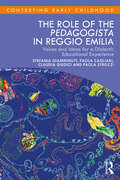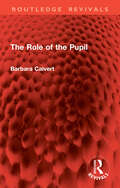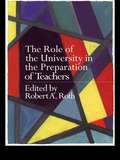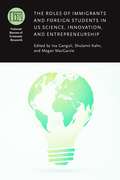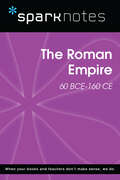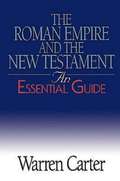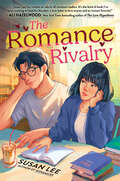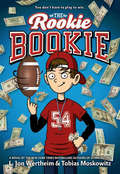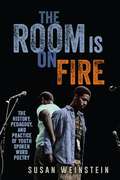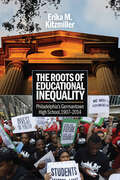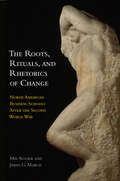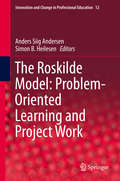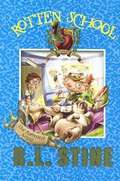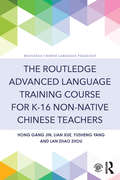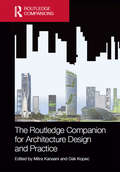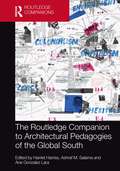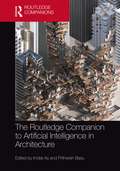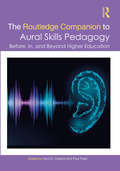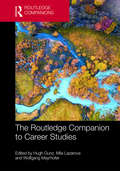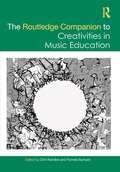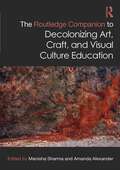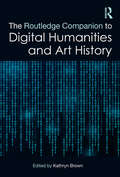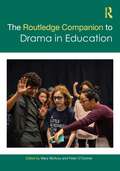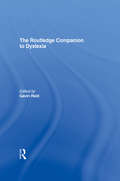- Table View
- List View
The Role of the Pedagogista in Reggio Emilia: Voices and Ideas for a Dialectic Educational Experience (Contesting Early Childhood)
by Paola Cagliari Claudia Giudici Stefania Giamminuti Paola StrozziThe Role of the Pedagogista in Reggio Emilia offers unparalleled insight into dialectic encounters between teachers, pedagogistas, and atelieristas in the world-renowned municipal early childhood services of the city of Reggio Emilia. It sheds light on the system and culture that cares for and sustains an enduring educational experience, for the common good. Emerging from a collaborative research project with Reggio Children and the Preschools and Infant-toddler Centres – Istituzione of the Municipality of Reggio Emilia, this book features in-depth observations of pedagogistas, teachers, and atelieristas, as well as interviews with key figures in Reggio Emilia. Children’s learning is thoughtfully emphasised, as the authors render the inextricable connection between theory-practice-research, framing documentation and progettazione as artful collective experimentation. The authors illuminate how Reggio Emilia’s system sustains reciprocal professional formation through progettazione, contesting dominant marketplace discourses of early childhood education as a commodity and re-imagining settings driven by values of reciprocity, artistry, culture, and the common good. By troubling conventional views on education and care, professionalism of teachers, and educational leadership, this book will appeal to all those who long for something different and hope to shift the field of possibility for early childhood education culturally, socially, pedagogically, and politically. It will be a key resource for teachers, leaders, policy makers, and scholars in the whole field of education.
The Role of the Pupil (Routledge Revivals)
by Barbara CalvertAlthough the role of the teacher has been extensively explored, the role of the pupil has received very little attention in the sociology of education. This authoritative study, The Role of the Pupil (first published in 1975), is about what it means to be a school pupil, exposed to the often-conflicting expectations of teachers, parents and peers.The author has drawn on a wide range of sociological literature to focus not only on the basic role of pupil as learner but also on other important but neglected facets of the pupil role. The pupil appears as child-to-be-socialised, as teacher’s adversary, as savage-to-be-civilised, as customer, as wrong-doer. These viewpoints provide a fresh perspective on pupil relationships within and beyond the classroom. This book will be of interest to students and researchers of education and sociology.
The Role of the University in the Preparation of Teachers
by Robert A. RothAddresses a subject of common interest in developed countries - the apparently diminishing role of universities in the education of teachers. There is pressure to redesign teacher education, an on-going struggle between those who see the need to strengthen the knowledge base of teachers and those who favour learning on the job; there is a perceived need to define precisely what teachers need to know and be able to do and at the same time there is relaxation of entry standards for students entering the profession in an attempt to relieve the chronic shortage of teachers. This situation is prevalent in the USA, in the UK, Europe and Australia. The struggle over who should control the preparation of teachers is the significant emerging issue in education, and could change the whole structure of the teacher preparation.
The Roles of Immigrants and Foreign Students in US Science, Innovation, and Entrepreneurship (National Bureau of Economic Research Conference Report)
by Ina Ganguli, Shulamit Kahn, and Megan MacGarvieThe number of immigrants in the US science, technology, engineering, and mathematics (STEM) workforce and among recipients of advanced STEM degrees at US universities has increased in recent decades. In light of the current public debate about immigration, there is a need for evidence on the economic impacts of immigrants on the STEM workforce and on innovation. Using new data and state-of-the-art empirical methods, this volume examines various aspects of the relationships between immigration, innovation, and entrepreneurship, including the effects of changes in the number of immigrants and their skill composition on the rate of innovation; the relationship between high-skilled immigration and entrepreneurship; and the differences between immigrant and native entrepreneurs. It presents new evidence on the postgraduation migration patterns of STEM doctoral recipients, in particular the likelihood these graduates will return to their home country. This volume also examines the role of the US higher education system and of US visa policy in attracting foreign students for graduate study and retaining them after graduation.
The Roman Empire (SparkNotes History Notes)
by SparkNotesThe Roman Empire (60 BCE-160 CE) (SparkNotes History Note) Making the reading experience fun! SparkNotes History Guides help students strengthen their grasp of history by focusing on individual eras or episodes in U.S. or world history. Breaking history up into digestible lessons, the History Guides make it easier for students to see how events, figures, movements, and trends interrelate. SparkNotes History Guides are perfect for high school and college history classes, for students studying for History AP Test or SAT Subject Tests, and simply as general reference tools.Each note contains a general overview of historical context, a concise summary of events, lists of key people and terms, in-depth summary and analysis with timelines, study questions and suggested essay topics, and a 50-question review quiz.
The Roman Empire and the New Testament: An Essential Guide (Abingdon Essential Guides Ser.)
by Warren CarterAn indispensable introduction to Roman society, culture, law, politics, religion, and daily life as they relate to the study of the New Testament.The Roman Empire formed the central context in which the New Testament was written. Anyone who wishes to understand the New Testament texts must become familiar with the political, economic, societal, cultural, and religious aspects of Roman rule. Much of the New Testament deals with enabling its readers to negotiate, in an array of different manners, this pervasive imperial context. This book will help the reader see how social structures and daily practices in the Roman world illumine so much of the content of the New Testament message. For example, to grasp what Paul was saying about food offered to idols one must understand that temples in the Roman world were not “churches,” and that they functioned as political, economic, and gastronomic centers, whose religious dealings were embedded within these other functions.Brief in presentation yet broad in scope, The Roman Empire and the New Testament: An Essential Guide will introduce students to the information and ideas essential to coming to grips with the world in which early Christianity was born.
The Roman Party: Independent Reading White 10 (Reading Champion #517)
by Sarah SnashallThis story is part of Reading Champion, a series carefully linked to book bands to encourage independent reading skills, developed with Dr Sue Bodman and Glen Franklin of UCL Institute of Education (IOE) Fantastic, original stories are accompanied by engaging artwork and a reading activity. Each book has been carefully graded so that it can be matched to a child's reading ability, encouraging reading for pleasure. Perfect for 7-9-year-olds or those reading book band white.Galan does not like visiting the Roman fort of Vindolanda to sell his fruit. The soldiers often shout at the local people. Them he finds himself going to a Roman party ...
The Romance Rivalry
by Susan LeeShe&’s read every romance…except her own.&“Clever and delightful; a standout in the genre.&” – ⭐KIRKUS STARRED REVIEW &“A must-have flirtation-via-tropes tale with all the swooning and joy readers want in a love story.&” – ⭐SCHOOL & LIBRARY JOURNAL STARRED REVIEW&“Susan Lee has written an ode to all romance readers. It&’s the kind of book I&’ve been wanting to read for decades: a love letter to love stories and an instant favorite!&”–Ali Hazelwood, New York Times bestselling author of The Love HypothesisIrene Park loves romance novels—so much so she&’s made a career of them as an online book reviewer with a massive following. But Irene&’s real life dating story? Non-existent.So when she starts her freshman year of college, she sets her sights on finding true love using the one thing she really understands…romance book tropes.If only it were that easy.Enter Aiden Jeon, Irene&’s online book review rival and biggest nemesis. When Aiden challenges her to see who can find love-by-trope first, he becomes the one person standing in her way to getting everything she wants both professionally and personally, too.So when the competition takes an unexpected turn, forcing the two of them to have to partner in the ultimate trope, fake dating, Irene is not prepared for everything she believed about romance, and Aiden, to flip on its head.As Irene tackles the challenges of college life, struggles to figure out what she really wants for herself, all while trying to win the race for love, Irene realizes the answers may not be found in a romance novel. Happily Ever Afters seem so easy on page.But for Irene to find her ultimate HEA, she&’ll have to get her nose out of the book and become the main character of her own story.Perfect for fans of:📚 Enemies to Lovers💘 Fake Dating🏫 College Rom-Coms💬 Banter for Days🎥 A+ Pop Culture References✨ Books about loving books
The Rookie Bookie
by L. Jon Wertheim Tobias J. MoskowitzNew kid Mitch Sloan wants to fit in, but his nerdy love of statistics and making money isn't winning him any friends in his sports-loving town--until he finds the perfect way to attain instant popularity. But running a football betting ring at school eventually turns sour, and Mitch loses the only real friend he's made. He'll have to win her back by using his brainpower for good and helping the school football team achieve victory--if they'll listen to the advice of a former bookie!
The Room Is on Fire: The History, Pedagogy, and Practice of Youth Spoken Word Poetry
by Susan WeinsteinThe Room Is on Fire offers an overview of youth spoken word poetry's history, its practitioners, participants, and practices. Susan Weinstein explores its grounding in earlier literary/performance/educational traditions and discusses its particular challenges. In order to analyze these issues, the story of how youth spoken word poetry developed as a field is told through the voices of those involved. Interviewees include the people who organized the first youth poetry slam festivals, the founders of central youth spoken word organizations, and a selection of young people who have participated in their local programs and in regional and national events over the last two decades. Narratives about individual and communal efforts and experiences are supported by analyses of full-text poems by youth poets and by reference to contemporary scholarship in performance studies, critical youth studies, and new literacy studies. Blending history and theory with practical descriptions of how spoken word poetry is taught and how to produce spoken word events, the book will appeal to researchers, teacher educators, and K–12 teachers.
The Roots of Educational Inequality: Philadelphia's Germantown High School, 1907-2014
by Erika M. KitzmillerThe Roots of Educational Inequality chronicles the transformation of one American high school over the course of the twentieth century to explore the larger political, economic, and social factors that have contributed to the escalation of educational inequality in modern America.In 1914, when Germantown High School officially opened, Martin G. Brumbaugh, the superintendent of the School District of Philadelphia, told residents that they had one of the finest high schools in the nation. Located in a suburban neighborhood in Philadelphia's northwest corner, the school provided Germantown youth with a first-rate education and the necessary credentials to secure a prosperous future. In 2013, almost a century later, William Hite, the city's superintendent, announced that Germantown High was one of thirty-seven schools slated for closure due to low academic achievement. How is it that the school, like so many others that serve low-income students of color, transformed in this way?Erika M. Kitzmiller links the saga of a single high school to the history of its local community, its city, and the nation. Through a fresh, longitudinal examination that combines deep archival research and spatial analysis, Kitzmiller challenges conventional declension narratives that suggest American high schools have moved steadily from pillars of success to institutions of failures. Instead, this work demonstrates that educational inequality has been embedded in our nation's urban high schools since their founding. The book argues that urban schools were never funded adequately. Since the beginning of the twentieth century, urban school districts lacked the tax revenues needed to operate their schools. Rather than raising taxes, these school districts relied on private philanthropy from families and communities to subsidize a lack of government aid. Over time, this philanthropy disappeared leaving urban schools with inadequate funds and exacerbating the level of educational inequality.
The Roots, Rituals, and Rhetorics of Change: North American Business Schools After the Second World War
by James G. March Mie AugierSome rather remarkable changes took place in North American business schools between 1945 and 1970, altering the character of these institutions, the possibilities for their future, and the terms of discourse about them. This period represents a minor revolution, during which business schools became more academic, more analytic, and more quantitative. The Roots, Rituals, and Rhetorics of Change considers these changes and explores their roots. It traces the origins of this quiet revolution to a diffuse community of like-mindedness forged by the depression and the Second World War, the reform of medical schools after the Flexner Report, the ideology of intellectuality championed by Robert Maynard Hutchins at the University of Chicago, and the experience of interdisciplinary collaboration at the RAND Corporation. It shows how these roots shaped discussions about management education and led to a shift in the rhetorical balance that weakened the place of business cases and experiential knowledge and strengthened support for a concept of professionalism that applied to management. The text considers at least three core questions: Should business schools concern themselves primarily with experiential knowledge or with academic knowledge? What vision of managers and management should be reflected by business schools? Finally, how does managerial education connect its teaching to some version of reality?
The Roskilde Model: Problem-Oriented Learning and Project Work
by Anders Siig Andersen Simon B. HeilesenThis book describes the pedagogical foundations of the Roskilde Model of education and educational design. It presents knowledge about how principles of problem-oriented, interdisciplinary and participant-directed project work may serve as a basis for planning and applying educational activities at institutions of higher learning. It discusses the dilemmas, problems, and diverging views that have challenged the model, provoking experiments and reforms that have helped develop practice without compromising the key principles. The Roskilde Model combines various student-centered learning concepts into a nexus, providing the foundation for a consistent pedagogical practice that is strongly supported by the educational structure and the academic profile of the university. A complex concept, the Roskilde Model refers to three different aspects: The first one is problem-oriented interdisciplinary and participant-directed project work (PPL). At Roskilde University, half of all study activities are organized in line with this particular pedagogical approach. The second aspect the model refers to is the organizing of university education on the basis of four interdisciplinary bachelor programmes. These programmes are part of the humanities, social sciences, natural sciences, and humanistic-technological sciences and give admission to two-year master programmes in a broad range of disciplines. The third aspect the model refers to is the interdisciplinary academic and educational profile of the university.
The Rottenest Angel (Rotten School #10)
by R. L. StineAngel Goodeboy is a perfect angel... You can almost picture a halo over his head! He even wears a T-shirt that says "Mommy's Little Angel." Bernie Bridges is horrified when Mrs. Heinie makes him share his room with Angel.
The Routledge Advanced Language Training Course for K-16 Non-native Chinese Teachers (Routledge Chinese Language Pedagogy)
by Hong Gang Jin Lian Xue Yusheng Yang Lan Zhao ZhouThe Routledge Advanced Language Training Course for K-16 Non-native Chinese Teachers is a content-based and thematically organized textbook designed for non-native in- and pre-service K-16 Chinese language teachers. Based on five years of field testing, the book offers an innovative approach to advanced language instruction, allowing users to further advance their language proficiency while continuing their professional development in teaching Chinese as a second or foreign language. The textbook: covers a range of up-to-date pedagogical and cultural themes provides a variety of engaging activities and exercises, allowing readers for K-16 to explore pedagogical and cultural issues in the target language with best classroom practices in mind familiarises users with authentic forms of modern communication in today’s China to better engage learners is accompanied by a Companion Website with audio recordings for each lesson as well as supplementary materials and teaching resources. The Routledge Advanced Language Training Course for K-16 Non-native Chinese Teachers is an essential resource for non-native Chinese teachers and for those on TCFL teacher training programs.
The Routledge Companion for Architecture Design and Practice: Established and Emerging Trends
by Dak Kopec Mitra KanaaniThe Routledge Companion for Architecture Design and Practice provides an overview of established and emerging trends in architecture practice. Contributions of the latest research from international experts examine external forces applied to the practice and discipline of architecture. Each chapter contains up-to-date and relevant information about select aspects of architecture, and the changes this information will have on the future of the profession. The Companion contains thirty-five chapters, divided into seven parts: Theoretical Stances, Technology, Sustainability, Behavorism, Urbanism, Professional Practice and Society. Topics include: Evidence-Based Design, Performativity, Designing for Net Zero Energy, The Substance of Light in Design, Social Equity and Ethics for Sustainable Architecture, Universal Design, Design Psychology, Architecture, Branding and the Politics of Identity, The Role of BIM in Green Architecture, Public Health and the Design Process, Affordable Housing, Disaster Preparation and Mitigation, Diversity and many more. Each chapter follows the running theme of examining external forces applied to the practice and discipline of architecture in order to uncover the evolving theoretical tenets of what constitutes today’s architectural profession, and the tools that will be required of the future architect. This book considers architecture’s interdisciplinary nature, and addresses its current and evolving perspectives related to social, economic, environmental, technological, and globalization trends. These challenges are central to the future direction of architecture and as such this Companion will serve as an invaluable reference for undergraduate and postgraduate students, existing practitioners and future architects.
The Routledge Companion to Architectural Pedagogies of the Global South (Routledge International Handbooks)
by Harriet HarrissThe established canon of architectural pedagogy has been predominantly produced within the Northern hemisphere and transposed – or imposed – across schools within the Global South, more often, with scant regard for social, economic, political or ecological culture and context, nor regional or indigenous pedagogic principles and practices. Throughout the Global South, architecture’s academic community has been deeply affected by this regime, how it shapes and influences proto-professionals and by implication architectural processes and outcomes, too. The Routledge Companion to Architectural Pedagogies of the Global South resituates and recenters an array of pedagogic approaches that are either produced or proliferate from the ‘Global South’ while antagonizing the linguistic, epistemological and disciplinary conceits that, under imperialist imperatives, ensured that these pedagogies remained maligned or marginalized. The book maintains that the exclusionary implications of architectural notions of the ‘orders’, the ‘canon’ and the ‘core’ have served to constrain and to calcify its contents and in doing so, imperiled its relevance and impact. In contrast, this companion of pedagogic approaches serves to evidence that architecture’s academic and professional advancement is wholly contingent on its ability to fully engage in an additive and inclusive process whereby the necessary disruptions that occur when marginalized knowledge confronts established knowledge result in a catalytical transformation through which new, co-created knowledge can emerge. Notions of tradition, identity, modernity, vernacularism, post-colonialism, poverty, migration, social and spatial justice, climate apartheid, globalization, ethical standards and international partnerships are key considerations in the context of the Global South. How these issues originate and evolve within architectural schools and curricula and how they act as drivers across all curricula activities are some of the important themes that the contributors interrogate and debate. With more than 30 contributions from 55 authors from diverse regional, racial, ethnic, gender and cultural backgrounds, this companion is structured in four sections that capture, critique and catalog multifarious marginalized pedagogical approaches to provide educators and students with an essential source book of navigational steers, core contestations, propositional tactics and reimagined rubrics. The Routledge Companion to Architectural Pedagogies of the Global South pioneers a transposable strategy for academics from all disciplines looking to adopt a tested approach to decolonizing the curriculum. It is only through a process of destabilizing the hegemonic, epistemological and disciplinary frameworks that have long-prescribed architecture’s pedagogies that the possibility of more inclusive, representative and relevant pedagogical practices can emerge.
The Routledge Companion to Artificial Intelligence in Architecture
by Imdat As and Prithwish BasuProviding the most comprehensive source available, this book surveys the state of the art in artificial intelligence (AI) as it relates to architecture. This book is organized in four parts: theoretical foundations, tools and techniques, AI in research, and AI in architectural practice. It provides a framework for the issues surrounding AI and offers a variety of perspectives. It contains 24 consistently illustrated contributions examining seminal work on AI from around the world, including the United States, Europe, and Asia. It articulates current theoretical and practical methods, offers critical views on tools and techniques, and suggests future directions for meaningful uses of AI technology. Architects and educators who are concerned with the advent of AI and its ramifications for the design industry will find this book an essential reference.
The Routledge Companion to Aural Skills Pedagogy: Before, In, and Beyond Higher Education (Routledge Music Companions)
by Kent D. Cleland; Paul FleetThe Routledge Companion to Aural Skills Pedagogy offers a comprehensive survey of issues, practice, and current developments in the teaching of aural skills. The volume regards aural training as a lifelong skill that is engaged with before, during, and after university or conservatoire studies in music, central to the holistic training of the contemporary musician. With an international array of contributors, the volume captures diverse perspectives on aural-skills pedagogy, and enables conversation between different regions. It addresses key new developments such as the use of technology for aural training and the use of popular music. This book will be an essential resource and reference for all university and conservatoire instructors in aural skills, as well as students preparing for teaching careers in music.
The Routledge Companion to Career Studies (Routledge Companions in Business, Management and Accounting)
by Wolfgang Mayrhofer Mila Lazarova Hugh GunzThe Routledge Companion to Career Studies is an in-depth reference for researchers, students, and practitioners looking for a comprehensive overview of the state of the art of career studies. Split into five parts, the volume looks at major areas of research within career studies and reflects on the latest developments in the areas of theory, empirical studies, and methodology. The book's five parts cover (1) major theoretical and methodological debates and approaches to studying careers; (2) careers as dynamic, ongoing processes covering such issues as time, shaping careers, career outcomes and patterns, and the forces shaping careers; (3) the local, national, and global context of careers, (4) implementing career research to design practical interventions in areas such as education, counseling, and national policy; and (5) a commentary on the current state of career scholarship and its future development as represented in this volume, by founding scholars in the field. This book will be a sourcebook for scholars studying careers, research students intending to take up the study of careers, and anyone – scholars and practitioners – with an interest not only in understanding careers, the factors shaping them and where they lead, but also in how this understanding might be used in practice.
The Routledge Companion to Creativities in Music Education (Routledge Music Companions)
by Clint Randles, Pamela BurnardViewing the plurality of creativity in music as being of paramount importance to the field of music education, The Routledge Companion to Creativities in Music Education provides a wide-ranging survey of practice and research perspectives. Bringing together philosophical and applied foundations, this volume draws together an array of international contributors, including leading and emerging scholars, to illuminate the multiple forms creativity can take in the music classroom, and how new insights from research can inform pedagogical approaches. In over 50 chapters, it addresses theory, practice, research, change initiatives, community, and broadening perspectives. A vital resource for music education researchers, practitioners, and students, this volume helps advance the discourse on creativities in music education.
The Routledge Companion to Decolonizing Art, Craft, and Visual Culture Education (Routledge Art History and Visual Studies Companions)
by Amanda Alexander Manisha SharmaThis companion demonstrates how art, craft, and visual culture education activate social imagination and action that is equity- and justice-driven. Specifically, this book provides arts-engaged, intersectional understandings of decolonization in the contemporary art world that cross disciplinary lines. Visual and traditional essays in this book combine current scholarship with pragmatic strategies and insights grounded in the reality of socio-cultural, political, and economic communities across the globe. Across three sections (creative shorts, enacted encounters, and ruminative research), a diverse group of authors address themes of histories, space and land, mind and body, and the digital realm. Chapters highlight and illustrate how artists, educators, and researchers grapple with decolonial methods, theories, and strategies—in research, artmaking, and pedagogical practice. Each chapter includes discursive questions and resources for further engagement with the topics at hand. The book is targeted towards scholars and practitioners of art education, studio art, and art history, K-12 art teachers, as well as artist educators and teaching artists in museums and communities.
The Routledge Companion to Digital Humanities and Art History (Routledge Art History and Visual Studies Companions)
by Kathryn BrownThe Routledge Companion to Digital Humanities and Art History offers a broad survey of cutting-edge intersections between digital technologies and the study of art history, museum practices, and cultural heritage. The volume focuses not only on new computational tools that have been developed for the study of artworks and their histories but also debates the disciplinary opportunities and challenges that have emerged in response to the use of digital resources and methodologies. Chapters cover a wide range of technical and conceptual themes that define the current state of the field and outline strategies for future development. This book offers a timely perspective on trans-disciplinary developments that are reshaping art historical research, conservation, and teaching. This book will be of interest to scholars in art history, historical theory, method and historiography, and research methods in education.
The Routledge Companion to Drama in Education
by Mary McAvoyThe Routledge Companion to Drama in Education is a comprehensive reference guide to this unique performance discipline, focusing on its process-oriented theatrical techniques, engagement of a broad spectrum of learners, its historical roots as a field of inquiry and its transdisciplinary pedagogical practices. The book approaches drama in education (DE) from a wide range of perspectives, from leading scholars to teaching artists and school educators who specialise in DE teaching. It presents the central disciplinary conversations around key issues, including best practice in DE, aesthetics and artistry in teaching, the histories of DE, ideologies in drama and education, and concerns around access, inclusivity and justice. Including reflections, lesson plans, programme designs, case studies and provocations from scholars, educators and community arts workers, this is the most robust and comprehensive resource for those interested in DE’s past, present and future.
The Routledge Companion to Dyslexia
by Gavin ReidThe Routledge Companion to Dyslexia is a ground-breaking analysis of the whole field of dyslexia by a distinguished team of international contributors and editors, engaged in literacy, inclusion and learning. Their diverse perspectives and wide expertise make this invaluable guide one of the most important additions to the field of dyslexia for over a decade. Dyslexia is without doubt the most high profile and contentious learning difficulty, and it is a topic that has attracted a vast amount of research, opinion, professional schisms, and debate. The Companion provides an invaluable overview of the field of dyslexia with vital and clear emphasis on linking theoretical perspectives with best practice. This accessible text: presents a survey of current and future development in research, with a focus on how research can inform practice focuses on areas such as neurobiology, phonological processing, literacy acquisition, numeracy and multilingualism considers assessment and identification, with contributions on early identification, reading, spelling and mathematics addresses identifying and meeting needs in an inclusive context discusses inclusion and barriers to learning in a variety of different national contexts includes models of instruction, direct instruction, co-operative learning and cross-curricular learning. The Routledge Companion to Dyslexia is a superb resource for anyone interested in the subject, whether in education or related subjects such as psychology or neurology. Fully indexed and cross-referenced, with helpful further reading sections at the end of each entry, it is ideal for those coming to the field of dyslexia for the first time as well as students and practitioners already familiar with the subject.
